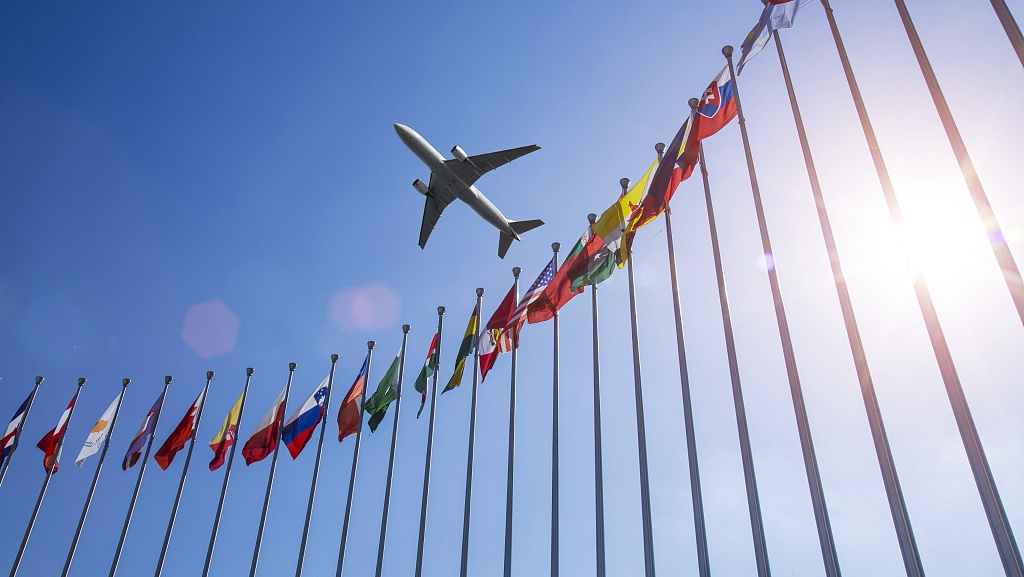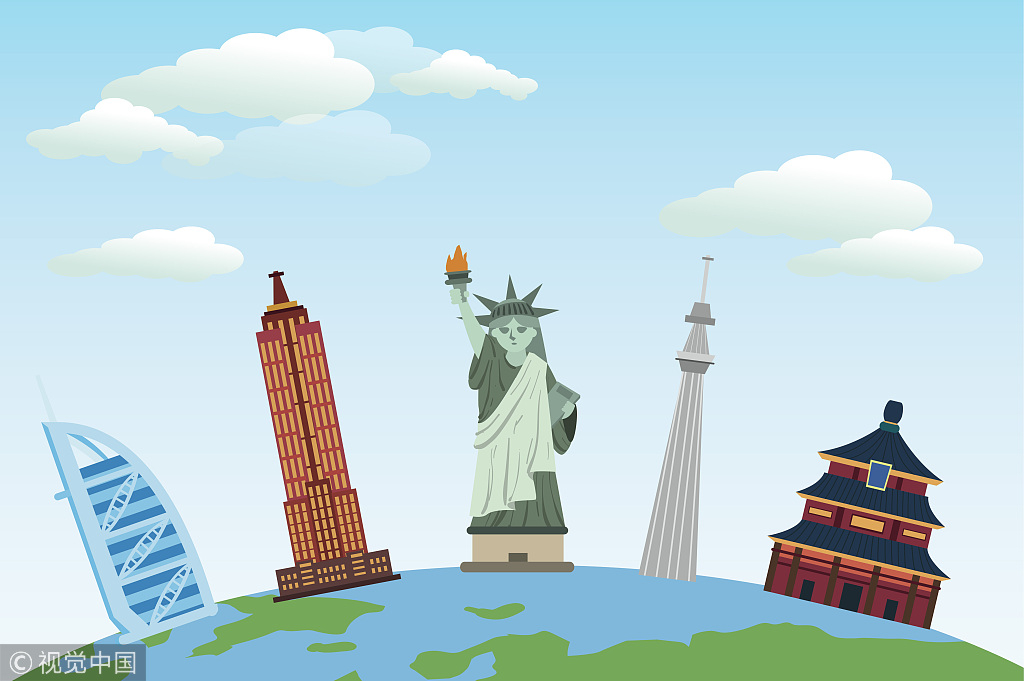As Trump engages in strong-arming the international community to satiate his “America First” mentality, he may be handing over the country's dominance in soft power on a silver platter.
A recent Gallup report notes that for the first time, global approval of Chinese leadership has surpassed that of the United States. In a comprehensive survey of over 134 countries, median approval of the country's leadership in 2018 stood at 34 percent, three points higher than that of the United States.
The development is unsurprising, with China, the second largest economic power, reiterating the call for globalization when this tenet of the world order is under threat. U.S. President Donald Trump and his entourage of trade hawks have acted as the counterpoint to the trend of multilateralism, and taken a much tougher stance in diplomacy, even with its allies. As a result, approval of U.S. leadership is at an all-time low, according to the poll. Meanwhile, Chinese President Xi Jinping has stepped up to defend community and free trade. This positive perception of Xi is a validation of his efforts over the past year.
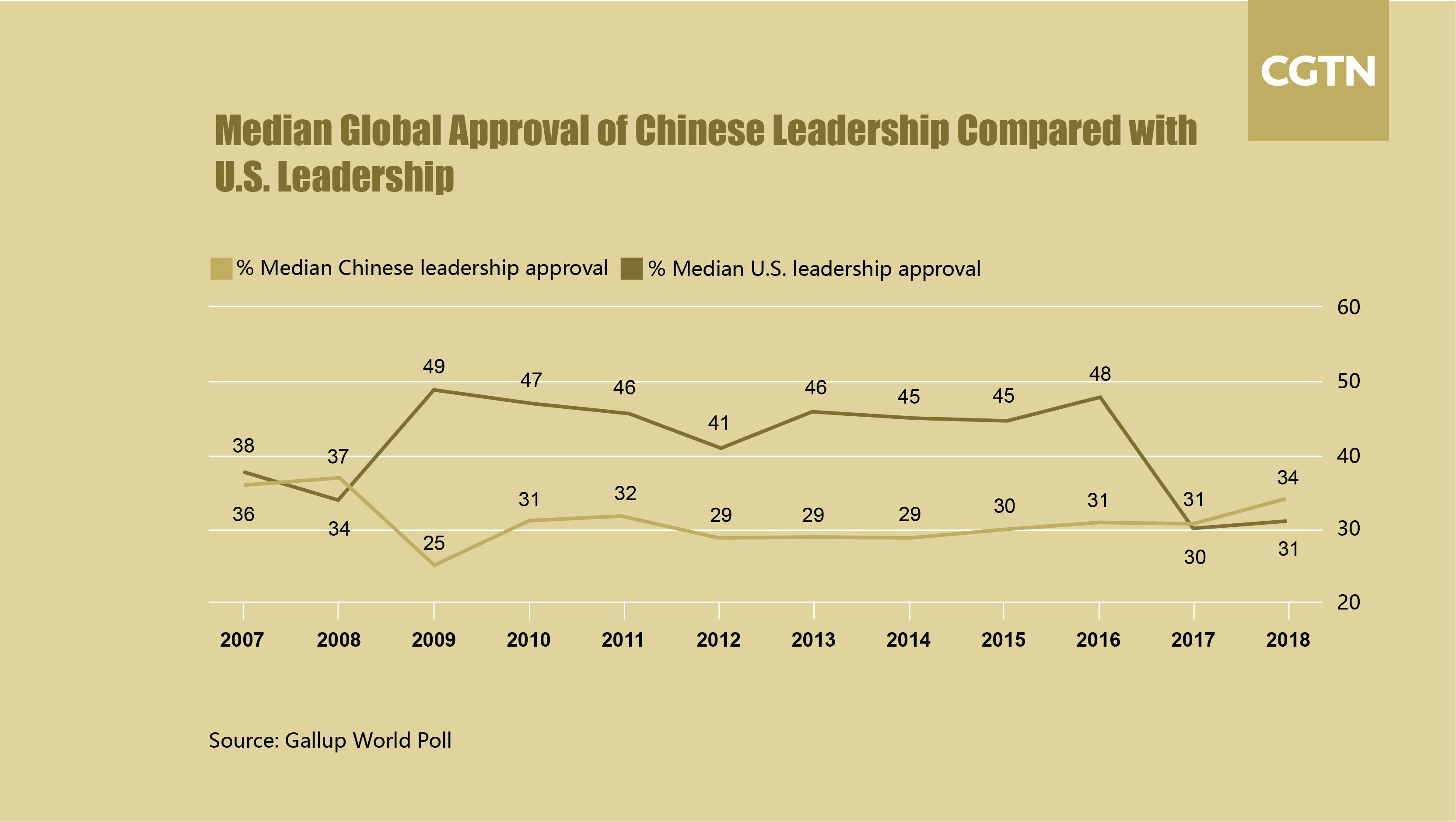
Comparing global leadership approval ratings between China and the U.S. between 2007 and 2018. /CGTN Photo by Qu Bo
Comparing global leadership approval ratings between China and the U.S. between 2007 and 2018. /CGTN Photo by Qu Bo
The report notes that China has the highest approval in Africa, where it has made numerous investments in infrastructure and created enterprises that have boosted regional economies. From the standard-gauge railway in Kenya to multi-billion-dollar financial commitments, China has made it clear that it wants to encourage the rise of developing countries while building better diplomatic relationships.
In September 2018 at the Forum on China-Africa Cooperation, Xi noted that his government will provide 60 billion U.S. dollars in financial support such as credit lines, grants and interest-free loans to African countries. Out of the 55 countries in Africa, 51 of its leaders came to Beijing that month, in an unprecedented gathering that signaled the hope of cooperation between countries on the continent and with China.
Back in Asia, China's investments through its signature Belt and Road Initiative (BRI) have been a boon to its hard and soft power. In landlocked countries such as Tajikistan and Kyrgyzstan, BRI money is flowing into highways, railways and power transmission projects that have brought economic vitality into the region. China's high-profile infrastructure projects also include ports in Pakistan and Cambodia, as well as a high-speed rail in Indonesia. Ratings agency Fitch estimated back in 2017 that China had 900 billion U.S. dollars in projects that were planned or underway.
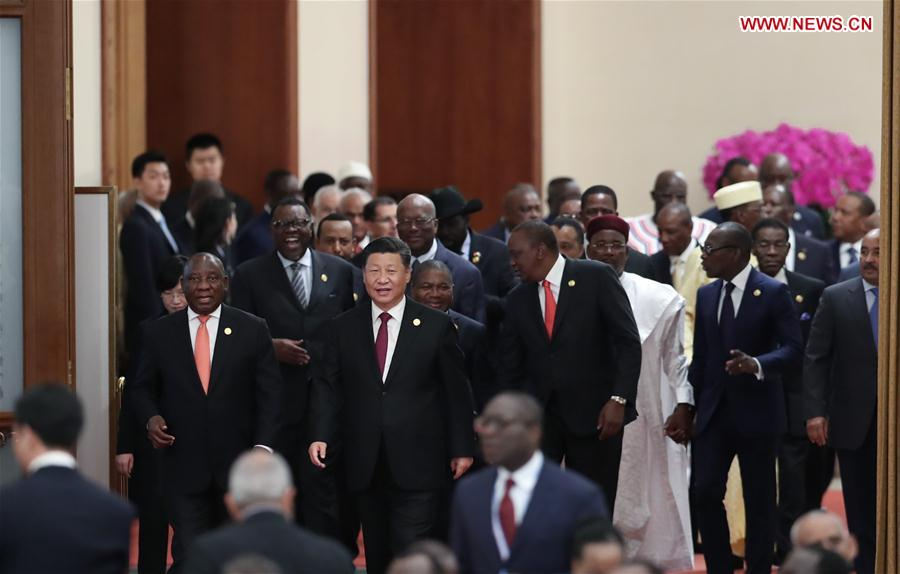
Chinese President Xi Jinping (C) and South African President Cyril Ramaphosa, who is the African co-chair of the Forum on China-Africa Cooperation (FOCAC), and heads of delegation of the other 53 African members of the FOCAC, arrive at the venue of the roundtable meeting of the 2018 FOCAC Beijing Summit, September 4, 2018. /Xinhua Photo
Chinese President Xi Jinping (C) and South African President Cyril Ramaphosa, who is the African co-chair of the Forum on China-Africa Cooperation (FOCAC), and heads of delegation of the other 53 African members of the FOCAC, arrive at the venue of the roundtable meeting of the 2018 FOCAC Beijing Summit, September 4, 2018. /Xinhua Photo
While investments abroad have garnered widespread approval, China reassured global markets that it doesn't only offer rousing words in the face of the U.S.' unilateralist tendencies. Back in November last year, the country instilled confidence in what is poised to become the world's largest consumer market in 2019 by holding the world's first expo for imports in Shanghai, aptly named the China International Import Expo (CIIE). Over 3,000 companies from 130 countries and regions took part, trying to appeal to Chinese consumers and strike up local partnerships as China transitions from a manufacturing to a consumer economy.
The country's economic outreach and message of international cooperation have become apparent, and thus are returning dividends in the form of global approval. At a time when the U.S. is actively ceding its authority by alienating allies and going back on international agreements, President Xi has stood fast in upholding a global fraternity. He noted at the Asia-Pacific Economic Cooperation – the region's prestigious economic gathering – that the world was at a “crossroads in history.”
He called for continued support for free trade and the adamant rejection of protectionism. Xi had emphasized this earlier in April last year, saying that “[China] will never threaten anyone, nor overthrow the existing international system” no matter how rich or powerful the country becomes.
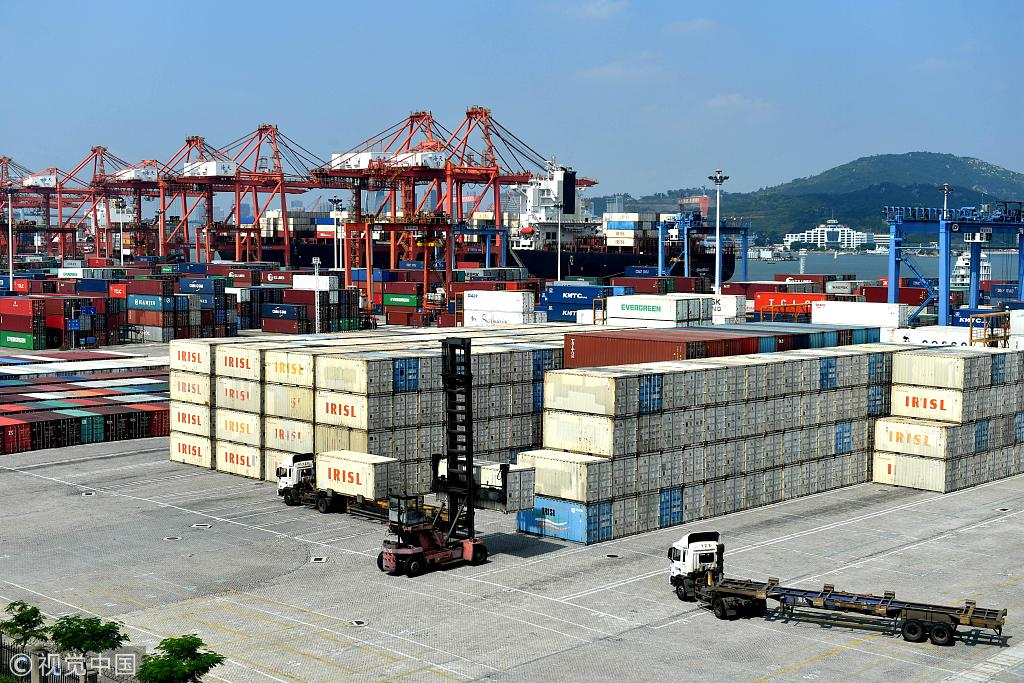
A port in Xiamen City, east China's Fujian Province /VCG Photo
A port in Xiamen City, east China's Fujian Province /VCG Photo
Across the pond, the 45th U.S. president pulled the world's biggest power out of the Paris climate accord and instead sought to expand the use of fossil fuels. In the new budget for fiscal 2020, he gave greater priority to coal, nuclear and national security than renewable energy and climate change.
Aside from this global concern, the White House, largely occupied by trade skeptics, roiled the global economy in the name of creating more jobs for Americans and bringing manufacturing back to their land. The U.S. quit the Trans-Pacific Partnership (TPP) and waged a trade war against China, which has ultimately started seeing a rosy picture after an internecine year. Tariffs were also imposed on the country's European allies and Japan, which felt estranged by their “big brother.”
Trump's withdrawal doctrine also witnessed the U.S. departing from UNESCO, the Iran nuclear deal and the Universal Postal Union. And while Europeans have been struggling over how to treat the influx of immigrants, the White House declared a national emergency in order to build a southern border wall to keep out illegal immigrants.
Trump's controversial travel ban targeting several Muslim-majority countries has also aroused indignation and shattered hopes of the people who toil hard on the American land, who cling to their American dreams and who believe in a liberal world order. The move has upended the very spirit of the modern Western world – idealism and liberty.
In addition, Trump's consistent demand for his NATO allies to increase spending, and most recently, his withdrawal from the Intermediate-Range Nuclear Forces Treaty exposed the U.S.' traditional friends to security risks, painting America in a horrible light in Europe (a 24 percent approval rating).
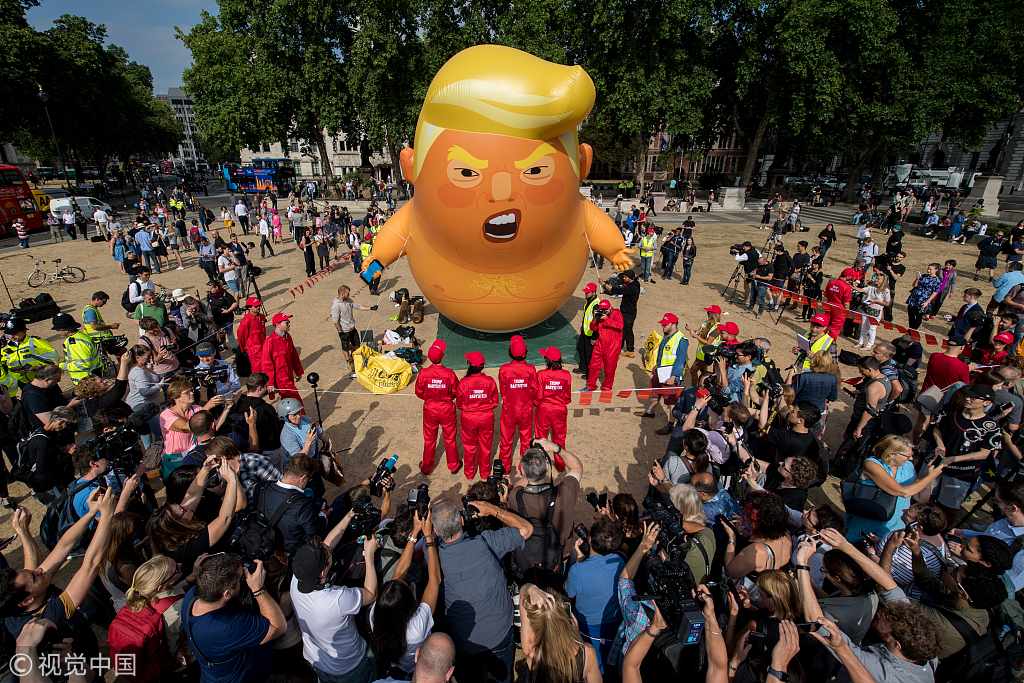
Demonstrators raise a six-meter high effigy of Donald Trump, dubbed the "Trump baby," in Parliament Square in protest against the U.S. president's UK visit, in London, July 13, 2018. /VCG Photo
Demonstrators raise a six-meter high effigy of Donald Trump, dubbed the "Trump baby," in Parliament Square in protest against the U.S. president's UK visit, in London, July 13, 2018. /VCG Photo
However, the Gallup poll, in the end, points out that “it is currently unclear if this firmer footing will continue to give China's leadership a leg up over U.S. leadership.” As Joseph Nye, the American political scientist, once said, “Power is like the weather. Everybody talks about it, but few understand it.” Contention for leadership approval is not a zero-sum game.
Despite tensions between both countries, the Chinese leadership has continued on the path of opening up and globalization. The echoes of approval are icing on the cake, but real victory is achieved only when every country can join hands to prosper together and realize that the time when a country be an island unto itself has long passed.

